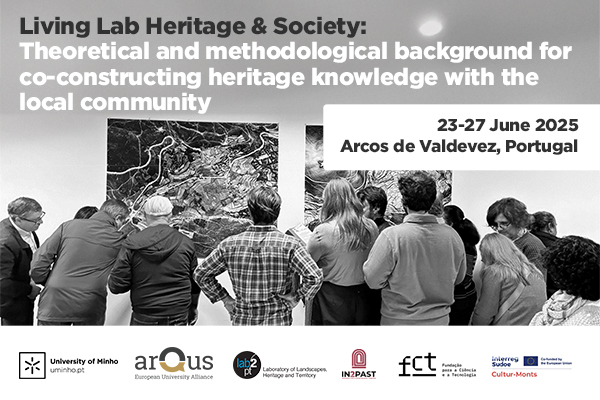Living Lab Heritage & Society: Theoretical and Methodological Background for Co-constructing Heritage Knowledge with the Local Community is a workshop designed for students, teachers and researchers to engage with the local community of the village of Extremo, Arcos de Valdevez, in Northern Portugal. Extremo is a living laboratory for archaeological work, memory and heritage analysis, and community-based research, as we witnessed at the end of January on the 3rd IN2PAST Field Trip.
The workshop is an initiative of the Universities of Minho (Portugal), Granada (Spain) and Leipzig (Germany) as part of the Arqus European University Alliance and its European Identity & Heritage Living Labs, drawing on work already carried out in Extremo by the team led by Lab2PT – UMinho / IN2PAST researcher Rebeca Blanco-Rotea, namely through IN2PAST’s Land-CST exploratory project.
This living lab on Heritage & Society takes place between 23 and 27 June, in a blended/ hybrid format, with the on-site morning classes held at Extremo being streamed, and the afternoon classes and workshops with the local community being recorded and later uploaded to the Arqus YouTube channel. Participation requires registration.
Arqus Living Labs are meant as open spaces for co-creation between academics, educators, professionals, students, local communities and external partners, and this one is no exception. The aim is to address local development issues through joint efforts and collaborative knowledge building, focused in this case on cultural heritage and the agrarian landscape.
The organisers promise to enhance the experience by means of the contribution of lecturers and researchers from the 3 Arqus Alliance universities directly involved (Granada, Leipzig and Minho), as well as from other universities such as A Coruña and Oviedo (Spain). From Lab2PT – UMinho / IN2PAST, participants will meet, besides Rebeca Blanco-Rotea, Cidália Silva, Diana Mendes, Diego Machado, Eduardo Alves, Liliana Neves and Natália Botica.
Activities will be held in English, Portuguese and Spanish, and key topics are:
